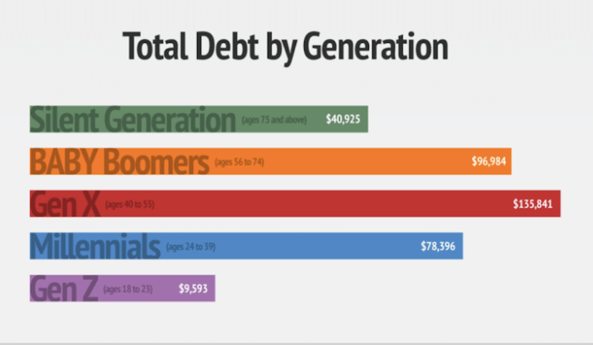The day you become a parent is a day of overwhelming emotions. You may experience joy at the sight of your precious child, relief that he or she made it out of the womb, and for many of you, fear and anxiety because you somehow have to turn that seven-pound baby into an independent, responsible, and successful adult.
As parents, there are so many things we have to teach our children, beginning with the basics of how to eat and share toys to more complicated lessons such as making decisions and getting along with others. As a society, we are excelling in some areas of parenting, but falling behind in others. In a recent National Financial Capabilities Study, only 24 percent of Millennials (age 23-35) were able to answer the first three financial literacy questions correctly, and a mere 8 percent answered them all correctly.[1]
Most parents agree that we need to do a better job teaching our kids about money. Last year, T Rowe Price reported that 80 percent of parents didn’t think schools were doing enough to teach kids about financial matters.[2]However, parents cannot abdicate all responsibility to the schools. Raising children and teaching them to navigate the world is first and foremost a parent’s responsibility.
Set A Good Financial Example
The first step in teaching your kids about finances is modeling what you want them to learn. Few parents would disagree with this concept. The same T Rowe Price study mentioned above found that 69 percent of parents are very/extremely concerned about setting a good financial example for their kids. The vast majority, eight out of ten, feel that they are setting a good financial example, but two-thirds also admit to doing things that wouldn’t qualify as setting a good example.
An enormous 40 percent admitted that when it comes to talking to their kids about finances, it’s “Do as I say, not as I do.” Anyone who has raised kids knows that isn’t enough. My clients tell me they are very concerned about setting a good example for their children. The first step in teaching your kids about money is simple: Show them.
Talk About Finances
Sometimes a silent model isn’t quite enough, and some areas of personal finance aren’t very visible. That is why it is imperative to talk to your kids about finances. But talking about money may be a long-standing cultural taboo. Often this reluctance to discuss financial matters spills over into the home as well.
Forty-nine percent of the parents in the T Rowe Price study said they rarely or never discuss family finances with their children. Eighteen percent admitted to being very/extremely reluctant to discuss financial matters with their kids and 72 percent of parents experience at least some reluctance to having such a discussion. But how are kids going to learn about money if you avoid talking to them about it? Some topics require more in-depth discussion and openness and finances are one of them.
Get Your Kids Involved
If you want financial understanding to actually sink in, you need to get your kids involved. Learning theory and research have consistently shown that the more active a learning experience is, the greater the learning gains and retention.[3] Most people have to do something to truly learn it.
How does this work with kids? Here are some ways I’ve put this into practice with my daughter: Even though she is young, I have taught her the difference between a penny, nickel, dime and quarter. Beyond just teaching the values of the coins, I then show her how to earn money by completing basic, age-appropriate chores such as making her bed and folding her clothes. As her coins start adding up, she has the opportunity to buy a toy or to save her money and earn interest (a penny for every dollar). Just as any adult, she loves the idea of making money for no extra work, so she often chooses the savings option!
At this point, I take a step back and let my daughter make her own financial decisions (and sometimes mistakes) so that she can learn from them. She and I have different values and I’ve learned that I need to let her be independent and respect her choices. On one occasion, she decided to impulsively purchase a My Little Pony beanie baby that I thought would be a waste of money. Rather than refusing to buy the toy for her, I took a step back and allowed her to buy it with her own money. Sometimes I am surprised in the process, as she still plays with this toy three months later!
Imparting financial wisdom to your kids is a challenging process that takes years. So, if you don’t feel like you’re doing an adequate job of teaching your kids about money, you’re not alone. Even if you are doing a good job, you probably agree with the 77 percent of the T Rowe Price survey parents who said that they wished there were more resources available to help them teach their kids about financial matters.
I believe that every child can learn critical financial lessons at a young age that will set them up for future success. I want to provide you with the tools to help you on this journey. To set up a meeting, call my office at (949) 221-8105 x 2128, or email me at mike.loo@trilogyfs.com.
[1] http://gflec.org/wp-content/uploads/2015/01/a738b9_b453bb8368e248f1bc546bb257ad0d2e.pdf
[2] https://corporate.troweprice.com/Money-Confident-Kids/images/emk/2015-PKM-Report-2015-FINAL.pdf



